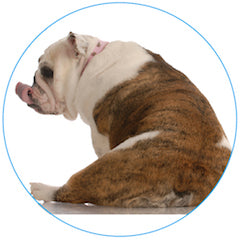What is an Anal Gland Abscess in Dogs?

You may have heard about an anal gland abscess and wondered what it is, or your pet may have been unfortunate enough to have one. So what is an anal gland abscess and how does it differ from other anal gland problems?
An anal gland abscess is one of the most severe results of anal gland problems in dogs and cats. Abscesses can occur almost anywhere in the body and are a collection of pus that has formed within a pocket of tissue in the body. In the case of an anal gland abscess, the pus has accumulated within the anal sac and is the result of an infection. If the anal glands are not properly draining they can build up material over-time that can lead to an infection. This typically can cause some redness or swelling of the area and your pet may lick the area excessively due to the discomfort.
As the fluid and pus build-up it creates pressure. This is the reason that we can see swelling, redness, and pain near the anal region. An abscess of the anal gland typically only forms on one side but in many cases both anal glands are affected to some degree. Pus is formed by white blood cells (hence pus is a whitish color) and the role of the white blood cells is to fight off infection. As the pus and fluid continues to accumulate it creates pressure that can eventually burst or rupture through the skin. When this happens you may see blood or fluid from the rear-end of your pet or possibly a gaping hole or opening.
Generally speaking allowing an abscess to drain is an important part of the treatment. So if the abscess has not ruptured on it's own, your veterinarian may need to sedate your pet and "lance" or open the abscess. Antibiotics alone would not be able to penetrate into the abscess so draining and flushing the area are important parts of the treatment.
In addition to draining the abscess and prescribing antibiotics, pain meds are often given to help with the discomfort and an elizabethan collar might be placed to prevent your dog from licking the area. In addition, your vet may recommend warm compresses to help reduce the swelling and facilitate further drainage of the area.
The best way to treat an anal gland abscess is to avoid it altogether! Carefully monitoring your pet for signs of anal gland problems and staying ahead of an abscess are important. Using Glandex® regularly can help support healthy anal gland function and natural emptying of the anal glands. If your dog's anal glands are not emptying properly then they may need to be expressed by your vet and additional medications may be needed.
Dr. James Bascharon, D.V.M.
This article is for informational purposes only and is not intended as medical advice or to replace proper medical attention. If your dog is experiencing anal gland problems or any other health issues you should seek a medical exam from your veterinarian.
Get in on the conversation! Post your questions or comments below. Our staff veterinarian will review your question and respond back to you.




